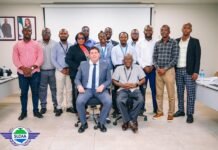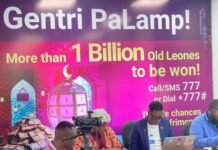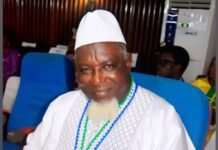By Amin Kef (Ranger)
Sierra Leone’s Minister of Foreign Affairs and International Corporation, Timothy Musa Kabba, has issued a formal apology to the Fullah Community following reports of maltreatment some of their members faced amid a diplomatic standoff with neighboring Guinea. The Minister emphasized that President Dr. Julius Maada Bio had not instructed anyone to target specific groups of people or deport Guineans in retaliation.
Speaking at the Government’s weekly press briefing on Tuesday, December 17, 2024, the Minister clarified the administration’s stance, stating, “The president of this country, President Julius Maada Bio, did not give anybody instruction to arrest any particular set of people, nor did he instruct anybody to round up Guineans for deportation in retaliation.”
Timothy Kabba disclosed that a delegation from Guinea, led by Guinea’s Foreign Minister Morissanda Kouyaté, is expected to visit Sierra Leone as a special envoy of Guinea’s junta leader, General Mamadi Doumbouya. The envoy will deliver a message to President Julius Maada Bio as part of efforts to ease tensions and restore diplomatic relations.
The apology comes after reports of mass arrests in Sierra Leone targeting people believed to be Guineans, which followed the deportation of Sierra Leoneans by Guinean authorities. This diplomatic clash led to a brief standoff at the Sierra Leone-Guinea border last week.
Prior to the Minister’s apology, the Fullah Progressive Union (FPU), an umbrella organization representing Fullahs in Sierra Leone, claimed that Fullahs were being unfairly singled out during the crackdown. The FPU demanded that those responsible for the actions against Fullahs be held accountable. In a statement signed by its National Secretary General, Alhaji Osman Bah, the FPU described the incident as a “shameful act of ethnic profiling and systemic harassment.”
“We find it deeply troubling that innocent Fullahs are being labeled as undocumented foreigners, arrested and detained,” the statement read, adding that similar arrests were reported in areas beyond Freetown, including Waterloo and Kono.
The incident has sparked outrage, with prominent figures such as former Attorney General and Minister of Justice, Joseph Fitzgerald Kamara, condemning the arrests. He labeled the incident as a “diplomatic failure” and called for “urgent action” to address it. “Every tribal community is entitled to security and protection from violations of their human rights,” he further asserted.
The diplomatic dispute between Sierra Leone and Guinea escalated after Guinean authorities reportedly deported over 200 Sierra Leoneans from Conakry, citing drug-related criminal activity in slum communities where Sierra Leonean nationals resided. Video footage circulated on social media showed people, believed to be Sierra Leoneans, fleeing as their makeshift homes were demolished. Upon arrival at the Sierra Leone-Guinea border, local immigration officials initially refused to accept the deportees, resulting in a temporary closure of the border. Vice President Dr. Mohamed Juldeh Jalloh later intervened, allowing the deportees to enter Sierra Leone.
It was earlier alleged that in an apparent retaliatory move, Sierra Leonean police launched operations that reportedly targeted individuals they suspected to be Guineans. The FPU argued that only Fullahs were targeted. Sheriff Barrie, Deputy National Secretary General of the FPU, questioned the rationale behind this selective approach. “Fullahs are not the owners of the Republic of Guinea. There are other immigrants as well. For the authorities to select and only clamp down on Fullahs is unacceptable,” he stated.
Sheriff Barrie further suggested that there may be a “hidden agenda” behind the raids and called for an investigation to identify those responsible.
Civil society organizations and human rights advocates echoed similar concerns. Saikujohn Barrie, a reporter for Premier News and a Human Rights Officer at the African Union, described the incident as reminiscent of the oppressive tactics used during the Siaka Stevens regime, which was known for its mistreatment of Fullahs.
Saikujohn Barrie raised critical questions about the legality of the arrests:
- Did the Government authorize the discriminatory arrests of only Fullahs as retaliation for the deportation of Sierra Leoneans from Guinea?
- Which law in Sierra Leone permits the police to engage in ethnic profiling?
- Are Fullahs the only community in Sierra Leone with ties to Guinea?
He criticized the police’s decision to detain vulnerable individuals, including elderly men, women and lactating mothers, at the Police Training School (PTS) in Hastings. The intervention of Members of Parliament from Falaba and Freetown, as well as the Western Area Fula Tribal Head and other stakeholders, led to the release of the detainees.
The FPU’s call for justice was echoed by other ethnic and civil society organizations, who see the incident as a dangerous precedent that could undermine Sierra Leone’s social cohesion.




